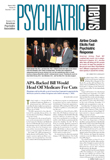The American Medical Association is undertaking its biennial ballot for specialty society representation within the AMA House of Delegates. APA, which now holds seven delegate seats, stands to lose one seat, unless more APA members who are also AMA members take the time to vote in the last few weeks before the January 31 deadline.
“It is critical to our patients that we continue to increase our influence within the House of Medicine,” APA President Richard Harding, M.D., told Psychiatric News. “The AMA has been increasingly receptive to issues of prime importance to psychiatry, such as parity. Our increased presence in the last two years is showing in AMA policies and actions on our patients’ behalf.”
Indeed, the increasingly stronger voice of psychiatry has been reflected in the positions that the AMA has taken on several issues of great concern to psychiatric patients over the past year or so, according to Joseph T. English, M.D., chair of the APA delegation to the AMA and a former APA president.
“Two years ago,” English told Psychiatric News, “we gained an increased presence in the House of Delegates through the last ballot. We have effectively utilized that increased visibility to prevail on issues important to our patients and to us as psychiatrists. We gained tremendously at the AMA’s annual meeting last June with Dr. Carolyn Robinowitz’s election to the AMA’s Council on Scientific Affairs and my appointment to the board of commissioners [of the Joint Commission on the Accreditation of Health Care Organizations]” (Psychiatric News, July 20).
English said that the delegation’s increased presence at the House of Delegates meetings as well as behind the scenes has benefited APA and psychiatric patients in a number of ways:
• Full AMA support for absolute parity in insurance coverage for mental health disorders.
• Full AMA support in opposing discriminatory carveouts of mental health benefits.
• Full AMA support of insurance coverage for substance abuse disorders.
• Full AMA support of physicians’ defense of scope of practice.
• Full AMA support of revisions of federal guidelines for seclusion and restraint.
In addition, the AMA’s Council on Medical Service issued the report “Access to Mental Health Services.” None of these issues would have been nearly as successful without the dedicated work of the current delegation, English said.
If psychiatry is to continue to work through the House of Medicine for the good of its patients, APA must maintain its current allotment and look to expand that presence in the future, English told Psychiatric News.
All members of the AMA are eligible to vote for a national medical specialty society that best represents their interests within the House of Delegates. Each specialty organization is awarded one voting delegate’s seat upon recognition by the house’s Specialty and Service Society. In addition, for each 1,000 AMA members who designate a particular specialty society to represent them, that specialty gains an additional delegate.
In addition to APA’s seven delegates, the American Academy of Child and Adolescent Psychiatry, the American Academy of Pain Medicine, and the American Society of Addiction Medicine each have one delegate seated in the house. Representatives of other psychiatric specialty organizations are also present in a nonvoting capacity. None of these organizations have enough AMA members in their membership to gain additional delegates; therefore, members of these organizations who want to increase the overall voice of psychiatry in the AMA are encouraged and welcome to designate APA as their representative specialty society.
According to AMA officials, at press time roughly 10,000 APA members were also members of AMA; however, fewer than 6,000 had registered a vote for APA as their designated specialty society. If 7,000 or more votes are cast for APA, an eighth delegate seat will be earned. However, if fewer than 6,000 votes are tallied, APA’s delegation will shrink to six seats.
“This year’s ballot is vital,” said English, “to maintaining—and even increasing—the voice of psychiatry within the House of Medicine. We must continue to articulate clearly the concerns of our patients to the rest of our profession and society. Our delegation to the AMA is the perfect vehicle to do so.” ▪
